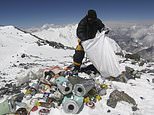
People who climb Mount Everest will have to bring their poo back to base campThe rules come amid concerns excrement left on Everest does not fully degrade
It’s something that features on many people’s bucket lists.
But if you’ve always dreamed of climbing Mount Everest, new regulations may make you reconsider.
People who climb the world’s highest mountain will now have to bring their own poo back to base camp.
The new rules come amid concerns excrement left on Everest does not fully degrade, with some climbers even falling sick.
‘Our mountains have begun to stink,’ Mingma Sherpa, chairman of Pasang Lhamu rural municipality, told the BBC.
It’s something that features on many people’s bucket lists. But if you’ve always dreamed of climbing Mount Everest, new regulations may make you reconsider
People who climb the world’s highest mountain will now have to bring their own poo back to base camp
Until now, climbers scaling Mount Everest have tended to either dig holes to go to the toilet, or have simply gone out in the open.
However, with temperatures known to drop to -60°C (-76°F), excrement does not fully degrade, leaving human stools visible on rocks.
To counter this issue, Pasang Lhamu has made the decision to force people climbing Mount Everest and the nearby Mount Lhotse to order poo-bags at base camp to collect their waste.
These will then be ‘checked on their return’, according to the BBC.
While the idea of carrying your waste around might sound digusting, the poo bags are specially designed to make the collection as dignified as possible.
According to the BBC, chemicals in the bags not only solidify the waste, but also render it ‘largely odourless.’
While the SPCC itself regularly climbs the mountain in search of rubbish, climbers are each asked to collect 17lbs (8kg) of rubbish they find on route
How tough is Mount Everest to climb?
Most expeditions take around two months.
Alpine Ascents recommends you spend at least a year training specifically to climb Everest.
‘You will need to progressively ramp up your hike time, distance, and elevation gain (at roughly 10 per cent per week) to safely and effectively build your climbing- specific conditioning,’ it claims.
Those hoping to reach the summit should also complete expeditions above 20,000ft (6,096m) beforehand, and have experience ‘dealing with equipment’ and ‘handling extremely cold temperatures and extreme altitude’.
Almost all those who climb Everest use a commercial expedition operator.
Prices vary from $65,000 (around £50,250) to $35,000 (£27,060). A tax of around $11,000 (£8,500) also goes to the Nepali Government.
And each climber has to pay $600 (£460) to the Sagarmatha Pollution Control Committee.
All expedition operators must have helicopter and life insurance.
Each bag can be used five to six times, which means most climbers should only need to take two with them during their expedition.
This isn’t the first time that poo bags have been given to climbers, according to Mr Mingma.
‘Mountaineers have been using such bags on Mount Denali (the highest peak in North America) and in the Antarctic as well, that is why we have been advocating for it,’ he said.
Human waste isn’t the only issue to deal with on Mount Everest.
Decades of commercial mountaineering have turned Mount Everest into the world’s highest rubbish dump.
As the number of climbers on the mountain has soared, the problem of waste disposal has worsened.
The worst rubbish is found at Camp Two, which is 21,000 foot (6,400m) above sea level.
In 2013, Nepal implemented a $4,000 rubbish deposit per team that would be refunded if each climber brought down at least eight kilograms (18 pounds) of waste.
On the Tibet side of the Himalayan mountain, they are required to bring down the same amount and are fined $100 (£75) per kilogram if they don’t.
In 2017 climbers in Nepal brought down nearly 25 tonnes of trash and 15 tonnes of human waste – the equivalent of three double-decker buses – according to the Sagarmatha Pollution Control Committee (SPCC).
However, this is just a fraction of the rubbish dumped each year, with only half of climbers lugging down the required amounts, the SPCC says.
Instead many climbers opt to forfeit the deposit, a drop in the ocean compared to the $20,000 (£15,000) – $100,000 (£75,000) they will have forked out for the experience.
WHAT IS BEING DONE TO REDUCE RUBBISH ON MOUNT EVEREST?
Decades of commercial mountaineering have turned Mount Everest into the world’s highest rubbish dump.
As the number of climbers on the mountain has soared – at least 600 people have scaled the world’s highest peak so far this year alone – the problem of waste disposal has worsened.
The worst rubbish is found at Camp Two, which is 21,000 foot (6,400m) above sea level.
Five years ago Nepal implemented a $4,000 (£3,000) rubbish deposit per team that would be refunded if each climber brought down at least eight kilograms (18 pounds) of waste.
On the Tibet side of the Himalayan mountain, they are required to bring down the same amount and are fined $100 (£75) per kilogram if they don’t.
In 2017 climbers in Nepal brought down nearly 25 tonnes of trash and 15 tonnes of human waste – the equivalent of three double-decker buses – according to the Sagarmatha Pollution Control Committee (SPCC).
This season even more was carried down but this is just a fraction of the rubbish dumped each year, with only half of climbers lugging down the required amounts, the SPCC says.
Instead many climbers opt to forfeit the deposit, a drop in the ocean compared to the $20,000 (£15,000) – $100,000 (£75,000) they will have forked out for the experience.
Another solution, believes Ang Tsering Sherpa, former president of the Nepal Mountaineering Association, would be a dedicated rubbish collection team.
Share or comment on this article:
People climbing Mount Everest will now have to bring their own poo back to base camp – as experts warn the world’s highest mountain has ‘begun to stink’
Source link
CHECK OUT: Top Travel Destinations
READ MORE: Travel News



